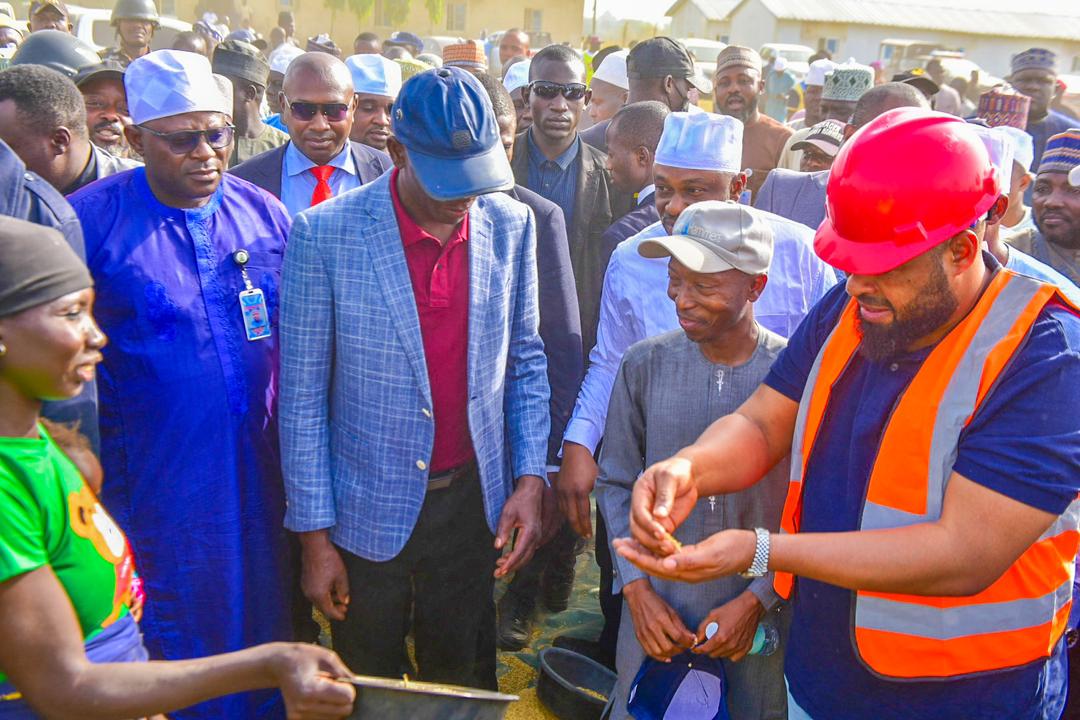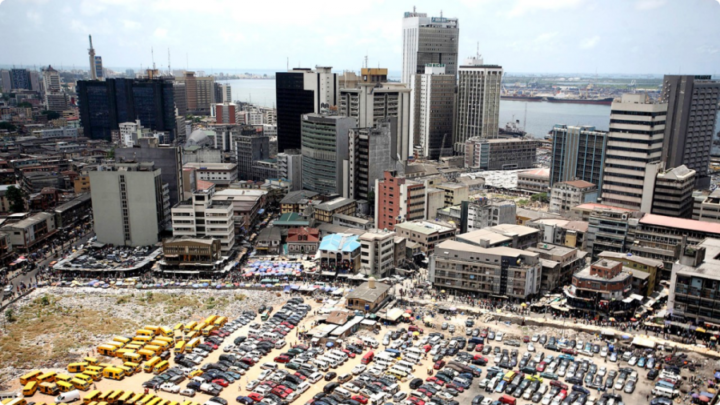“Today, we have 100 bulldozers now working in the bush, clearing the fields. We have cleared over a million hectares to date.” Umar Bago (March, 2024)
Coming on the back of the recent looting of food items across parts of Nigeria, the donation of food aid by a war challenged Ukraine, and the absurd involvement of the country’s anti-graft agency in food supply issues, the statements by Umar Bago, Governor of Niger State in north-central Nigeria, provide some hope for a short-medium term resolution to Nigeria’s food supply challenges. It also potentially provides a chance to address the decades-old paradox of a country with large arable land and sizable population- yet with a huge food import bill.
Some comparative context may help situate the agricultural potential of Nigeria, especially with Ukraine, which has been at war with Russia for over two years, but still has surplus agricultural yield to provide 25,000 tons of wheat as emergency food assistance to 1.3 million crisis-affected persons in Nigeria’s northeast. While Nigeria has a landmass of 923,768 km2, 35 million hectares of arable land and population of over 200 million people, Ukraine has a landmass of 603,628 km2, 32 million hectares of arable land and population of over 42 million people. While Nigeria has a forecasted production of 156,000 tons of wheat for 2023-24, that of Ukraine stands at 22.5 million metric tons.
That Nigeria is a net importer of food, spending over N7.8 trillion in the past six years on food import, and high food inflation at 40.01 percent, higher than general inflation of 33.20 percent, largely completes the contextual assessment of its agricultural sector, and food security analysis, of a sector that contributes 21.66 percent to overall GDP and employs 37.99 percent of labour force. That food inflation was 12.7 percent in 2009, but dropped to single digit 9.1 percent in 2015, which can explain the efficacy of the Growth Enhancement Scheme (GES) agriculture policy by Dr. Akinwunmi Adesina, the current President of African Development Bank (AfDB), who was Minister of Agriculture under President Goodluck Jonathan from 2011-2015, may provide some pathway of effective policies in Nigeria’s recent past, which may still be relevant.
Who then is the current governor of Niger state, that is attempting an agricultural revolution, going by his ambitious targets?
Born five decades ago, Mohammed Umar Bago earned basic and postgraduate degrees in political science, finance and business administration. The first part of his work life was in the private sector, where he spent over a decade in banking, working for a number of leading Nigerian commercial banks, before joining politics. He spent three elected terms in Nigeria’s House of Representatives from 2011-2023, and was a member of various parliamentary committees such as Appropriations, Banking, Education and ICT. He also chaired the committees on Maritime Administration, and Cooperation & Integration in Africa, before assuming office as Governor of Niger state in May, 2023.
Advertisement
Given the ambitious nature of Bago’s agricultural programme, encapsulated in the policy titled ‘Food Security and Agricultural Programme of Niger State’, the leadership component of such an ambitious programme therefore becomes a critical success factor. As such, Bago’s background in the private sector, as well as in politics, will provide some framework in assessing the capacities required for leading an agricultural revolution, as well as navigating the domestic and international political economy of agriculture.
The agriculture value chain largely consists of preparation, production, harvesting, storage, market access, with either processing or export, as the case may be. Though there is limited access on the details on the policy, an analytical attempt will be made on generic terms, for assessment purposes.
On land preparation for actual farming, Bago has committed the state government to “prepare the land, till it, prepare it for irrigation and planting, provide the inputs, fertilizers, and chemicals for farmers and also teach them through extension services. This is what the government is going to do for free.” This constitutes the start-off cost for anybody interested in farming, which the state government is ready to absorb. Though impressive, there is little available detail on how many farmers will be eligible for such subvention, as a way of determining how sustainable the absorption by Niger state of such start-off cost will be. It is however assumed that with the government having a database of all farmers as confirmed by the Governor, the projections and sustainability of this cost, especially with the Governor’s private sector experience, is determined. The Governor has also confirmed receipt of first batch of 300 tractors from John Deere, the United States (U.S.) based firm, while 700 more tractors are being expected. Together with over 1,000 handheld tillers that have been received, it is expected that the provision of prepared land and some mechanization equipment, will significantly boost agricultural yield in the state. And there is an assumption that Bago’s private sector experience would have ensured the provision of machine maintenance and after-sales-service for the tractors and tillers.
When investments have been made, and farmers produce agricultural products, market access becomes key, to prevent post-harvest losses, and adequate return on investment for sustainable farming. While Nigeria had a food import bill of N.7.8 trillion in the last six years, it will be erroneous to assume that all of what is imported, can be produced. Products, cost and variety vary. Market access therefore has to do with both Nigerian market, and international market. The Nigerian market comes relatively easy, given commonality in regulations and standards. It is in international market access, especially the high value markets, that the experience of Bago will be put to test. That Nigerian agricultural products have failed in large numbers, to gain access to the European Union (EU) and the U.S., despite encouraging policies such as the African Growth & Opportunity Act (AGOA), signposts the challenges with quality and phytosanitary standards in the sector. Bago therefore has to deploy his banking experience in banking regulation policy compliance, to ensure that agriproducts from the state comply with the National Quality Policy (NQP), as a means of enabling agriproducts from the state accessing high value markets such as the EU and USA, for higher return on investment. For the EU market, Bago will have to demonstrate considerable knowledge of the Common Agricultural Policy (CAP), as well as the politics arising from discontent by EU farmers over imports from non-EU countries. Perhaps, his chairmanship of the House Committee on Cooperation & Integration in Africa should have provided him sufficient knowledge and experience in international negotiations and diplomacy.
Still on high value markets and market access, there may be a focus on Middle Eastern countries, as geography and other factors make these countries import agricultural products. For example, Saudi Arabia, which is a Gulf Cooperation Council (GCC) country, imports $20billion worth of agricultural products annually, and African countries such as South Africa that account for less than 2 percent of all the imports, have devised strategies that include expanding production on two million hectares of land, to harness such international opportunities. GCC countries with total GDP of $2trillion, import about 85 percent of their food, around 93 percent of cereals, approximately 62 percent of meat and 56 percent of vegetables totaling $26.7 billion annually- more than double the Niger State GDP of $11.34 billion. If the Netherlands with a land area of 41,850 km2 is the second largest exporter of agricultural products in the world, then Niger state with a land area of 76,363 km2 (70 percent of it arable and cultivable) intentionally aiming for 5 percent of the GCC $26.7 billion annual agricultural import market; can yield an estimated annual income of $1.3 billion in export revenue, far more than the $16.43 million in capital importation from 2019-2021, adding 10 percent to the state’s GDP, and can justify investment for massive cultivation, transport and other value chain associated costs. Again, Bago’s diplomatic experience and private sector exposure, should mean that he leads the agriculture value chain to not just produce commodities that have negotiated access to Middle Eastern markets, but also refined products, processed foods and agro-allied products that fit into supermarket shelfs and industries that require them.
Market access, especially to international markets, requires that appropriate attention be given to transport and logistics. The governor has demonstrated understanding of this with a focus on the Minna Airport, which is a free zone, that contains the ambitious plan to expand the 2,000 hectares of land around the airport to 10,000 hectares of land. But with over 90 percent of global trade being maritime based, according to the World Bank, strategic attention should therefore be given to the state’s maritime port- Baro Inland Port.
With some colonial administrative history from 1912, Baro port, which has a length of 150 meters, 7,000 square meters cargo stacking yard, a transit shed of 3,600 square meters and an estimated capacity of 5,000 TEU at a time, is yet to commence operations, despite its inauguration by former President Muhammadu Buhari in January 2019. The gigantic mobile harbour crane, Reach Starker and three forklifts, water hydrant system, water treatment plant, and a 100 KVA generating set, have been lying dormant. The former state administration had envisaged a ‘Baro Smart International Port City’ with 728 km2 of land for Greater Baro Development Area. However, the non-operational state of the port requires more practical approaches, for the envisaged agricultural revolution. Poor land and marine access have been the main factors responsible for the dormant nature of the port. Land access to the port is of road and rail transport. For roads, the 55km Baro/Katcha/Agaie road and the Baro/Muye road linking Gegu on the Abuja/Lokoja expressway, are the two major access roads to the port, and they are in deplorable condition. Given the poor execution of federal government (FG) contracts for the rehabilitation of both roads, Governor Bago should perhaps liaise with the FG and have the state government take over the construction of both roads. His banking experience may also support efficient negotiations with the Infrastructure Concession Regulatory Commission (ICRC), for private-driven reconstruction and maintenance of both roads. For rail access, consideration can be given to the 565km Baro–Kano railway built in 1911, which became moribund in early 1970s, especially as railways have since the constitutional amendment of 2023, been on the Concurrent Legislative list for Nigeria, which allows state governments to play active roles.
Advertisement
And the constitutional amendment that expands prospects in railway transport is also strategic for Niger state and Baro Port, especially in the maritime sector. The marine access challenge for Baro Port is exemplified by the inability of FG over many decades, to ensure that the port and its access is navigable for ships. The FG had in December 2008, awarded a N34.8billion contract for the dredging of lower River Niger, from Warri in Delta State to Baro. Dredging of 572km of the river was expected to revive the two inland ports in Baro and Lokoja, impact about 152 communities by easing haulage of goods and trading activities, and reduce the duration of the journey from Onitsha to Baro to around 90 minutes by speedboat, instead of over nine hours it takes by road. Regular dredging was also expected to be done every two years.
However, since the last dredging of 2009, no maintenance dredging has taken place. Therefore, a trend analysis of the management of such critical resource by the FG highlights the need for a constitutional amendment that transfers maritime services to the Concurrent Legislative List, so that Niger state can join the FG to ensure effective management of maritime resources. With maritime as concurrent, Bago will be able to attract and negotiate private sector arrangements that ensures regular dredging, maintenance and ship navigation of Baro Port. Bago’s experience as Chairman of House Committee on Maritime, general parliamentary experience, and private sector knowledge provides him with adequate capacity to lead or support the drive for constitutional amendment of maritime services and private sector negotiations for sustainable utilization of Baro Port for international sale of agricultural products from Niger State, and other states of the federation.
Management lessons for the Baro Port can also be drawn from China, which has the Chang Jiang River that has been the busiest inland waterway transport route in the world, for repeated number of years. Transportation on China’s inland waterways amounted to over 4.4 billion tons and goods turnover of 1.9 trillion ton-kilometers in 2022.
While Bago has ambitious plans to establish ten state-owned universities across different disciplines in the state by 2027, it is expected that the University of Agriculture in Mokwa and the University of Technology in Zungeru, will be well funded and resourced, so that their teaching and research outcomes can support the envisaged agricultural revolution in crop science, food production, pest control, climate change, market research for targeted high-value markets such as the GCC countries, maintenance of existing machines and tools, manufacturing of machine spare parts, and development of machine designs that are best suited for agriculture and its value chain in the state.
The mixed results of previous policies such as Operation Feed the Nation, Green Revolution Programme, NALDA and Anchor Borrowers Programme (ABP) are enough lessons that can guide the state. Going by the submissions of the All Farmers Association of Nigeria (AFAN) on the financial integrity failure of the ABP, then there are enough positive lessons to learn from the Commercial Agriculture Scheme (CAS), implemented by Prof Charles Soludo as Governor of Central Bank of Nigeria. The GES policy by Dr. Akinwunmi Adesina as Minister of Agriculture, also has components that can be emulated. That such policy contributed in Dr. Adesina winning the World Food Prize-categorized as Laureate prize for agriculture, is testament to its efficacy. And the fact that Dr. Adesina is the current President of AfDB, with about the largest agricultural funding portfolio in Africa, points to stakeholders of common philosophical interest for Bago.
Advertisement
And there is the little detail of how Bago may manage the ‘bad belle’ envy that can come with success- if it happens. This is especially so, given his aspirational disposition. While he has previously aspired to the Speaker of the House of Representatives, he has also hinted of his desire to be President of Nigeria, in the future. Though these are for the future and destiny to determine, his experience in politics should equip him with the skills to manage any ill-wind, just as no proper society should discourage healthy ambition.
Effective leadership requires adequate capacity and skill set. And agriculture requires an appropriate measure of private sector and government support, to thrive. The lack of sufficient leadership experience in both, has been a bane for Nigeria. That Bago has both private sector and political experience, makes him a potential leadership catalyst in contemporary times. If he excels in Niger State, he can bring to fruition, not just an agricultural revolution in Nigeria, but also structural development goals that Dr. Akinwumi Adesina, World Food Prize laureate and AfDB President has conceptualized in his ‘United States of Nigeria’ hypothesis. Will Mohammed Umar Bago rise to the agricultural revolution challenge?
Uwanaka writes from African University of Science and Technology, Abuja. [email protected]







